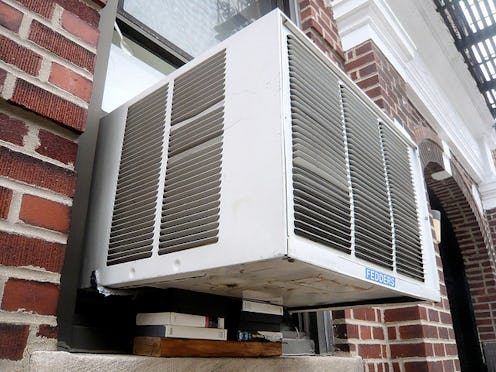
This week, as a heat wave enveloped vast chunks of our fair country, the call of America's dads could be heard far and wide: "Is it hot enough for ya?" I will personally wager that it is more than hot enough for you — with the temperature surpassing 90 degrees in many parts of the country right now, I'll bet that you're either melting into a puddle on the asphalt somewhere, cursing the day your parents drank so much boxed wine that they decided to make a baby; or you are curled up with your air conditioner, cradling it as if it were a lover (or at least a very friendly cat). In the 110 years since it first was popularized, air conditioning has become more than just a creature comfort for those of us living in warm climates — it allows us to conduct business as usual throughout the summer months, no matter how high the temperatures rise, and sometimes (especially for the elderly and folks with pre-existing health conditions), it can mean the difference between life and death.
But while air conditioning might be our savior in the summer heat, it's hard to miss all the negative talk about it. Popular fears about the dangers of air conditioning — that it might make us sick or somehow otherwise injure our bodies — haven't changed very much in the past 110 years.
So is there any truth to the purported dangers of air conditioning? Should you think twice before you spend a lazy summer day (or 30) lying in front of your window unit in your underpants, eating an ice pop and thanking the universe for modern technology? Let's check out three still-prevalent air conditioning myths and learn to chill, everyone (note: plenty of other coolant puns ahead; you have now been warned).
Myth #1: Air Conditioning Will "Shock" Your Body And Make You Sick
Since it first made its way into American homes and businesses, people have feared that the sudden change of temperature that air conditioning creates — from the muggy outdoors into the cool indoors — could somehow "shock" the body, making one more vulnerable to illnesses from colds to respiratory diseases. But there's never been any proof of this — which makes sense, considering that colds come from viruses, not cold temperatures. Plus, don't we also transition from one extreme temperature to the other when we come in from a snowy winter day into a warmly heated house? Isn't all of human life basically running away from one unpleasant temperature, in search of a more pleasant one, when you really think about it?
There is one small grain of truth here: many people feel that air conditioning dries out their sinuses, though there is some debate within the medical community about whether there is a direct causal relationship (but anecdotally, it certainly feels like there is a causal relationship). But beyond that, air conditioning isn't the general scourge of our lungs that many claim: air conditioning can help people with seasonal allergies, because it can lower humidity indoors, and reduce your exposure to outdoor allergens, as well.
Myth #2: Air Conditioning Spreads Disease
Lots of people fear that air conditioning is some kind of disease vector — a fear probably based in the famous 1976 outbreak of Legionnaire's disease at a hotel in Philadelphia, where it was rumored that the waterborne illness was transmitted through the hotel's air conditioning system.
And it is true that an air conditioner that is not being properly maintained can become a home for mold, allergens and other bacteria. There's nothing inherently moldy and gross about air conditioning, of course. But the cold air blowing through your air conditioner often leads to condensation and moisture on the coils, which can then turn to mold or other allergens if it isn't cleaned and maintained regularly. Once mold and allergens are present in your A/C unit or central air system, they can blow through the air, and potentially irritate allergies, or even make you sick.
Luckily, there's any easy fix for any mold-related threats posed by your air conditioner — change your filters regularly, and if you have central air, make sure to regularly have maintenance performed on it by a professional. When an air conditioner is kept clean, it shouldn't be any kind of danger to your health.
Myth #3: People Who Use Air Conditioners Are Sicker Than Other People
Some urban myths associate breathing air conditioned air with being sickly. There's been no conclusive proof of this, and it seems most likely to be a theory based out of confusion regarding another problem relating to air ventilation systems in general.
When many people in an office report feeling respiratory irritation, dizziness, nausea, or other similar symptoms, they're sometimes said to be experiencing something called "sick building syndrome" — meaning, basically, that the office's central air system is poorly maintained, staying too moist and spreading mold across an entire building. "Sick building syndrome" isn't that common — and thought a 1997 study in France found that workers in buildings with large central air systems suffered from more respiratory problems than those without central air, little follow-up research has confirmed that "sick building syndrome" is a common problem. However, if you feel that you have respiratory or other problems that worsen when you go to work, and improve when you leave, you should definitely talk to your doctor. You may not have a sick building, but you could be sick with something else. And that's the last thing you need (especially in this heat).
Images: Jason Eppink/ Flickr, Giphy (3)